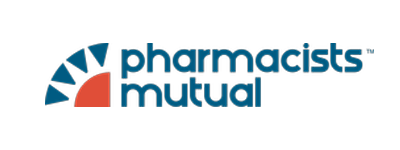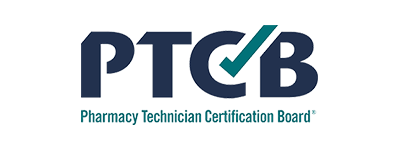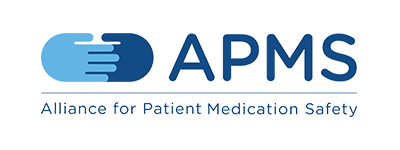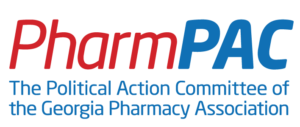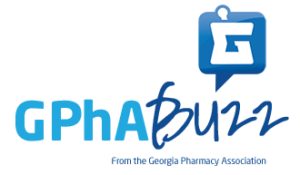Legislative Updates
2022 Legislative Update Days 21-24
March 7, 2022
We are more than halfway through the legislative session so the Capitol will be a little more hectic in the coming weeks. Next Tuesday, March 15 is crossover day, which is the deadline for a bill to pass out of either legislative chamber for the current session. There are numerous bills waiting for a vote including Representative Knight’s Medicaid managed-care prescription drug carve-out bill (HB1351).
HB 1351
Pharmacy Benefits Management for Medicaid Program
HB 1351 was scheduled for a House vote on Friday, March 4. Due to the number of bills on the floor that day, it was pushed to the next legislative day which is Tuesday, March 8. Thank you again for your participation in our last call to action. Many legislators relayed they received your calls and messages and will vote in support!
HB 1519
Prohibit Insurers from Changing Network Participation Contracts
Representative Knight sponsored this bill which will prohibit insurers from unilaterally changing network participation contracts impacting coverage, access to, or costs of ancillary services, which includes pharmacy services. This bill was introduced this week and has been assigned to the House Special Committee on Access to Quality Healthcare. GPhA will work with Representative Knight and other stakeholders to support this legislation.
HB 1279
Controlled Substance Compartmentalized Containers
Representative Matthew Gambill’s bill will allow anyone with a chronic disease or anyone over age 65, who has been prescribed one or medications, to carry their prescriptions in a compartmentalized container with the capacity to hold up to a 21 day supply. This bill was heard in the House Health and Human Services Committee where GPhA offered comments regarding the language in the bill. It passed via substitute with unanimous votes and is headed to the House.
HB 1453
Crimes and Offenses; Access to Medical Cannabis
Representative Sharon Cooper and Representative Micah Gravely are the main sponsors of this bill which looks to revise provisions regarding access to medical cannabis and to provide for accreditation of independent laboratories for testing low THC oil and products. Also, this bill would provide for additional Class 1 and Class 2 production licenses and transfer the operation and maintenance of the Low THC Oil Patient Registry from the Department of Community Health to the Georgia Composite Medical Board. This bill passed through committee via substitute and is on its way to the House.
Bills we are continuing to monitor…
HB 867
Truth in Prescription Pricing for Patients Act
Truth in Prescription Pricing for Patients Act was heard in the Special Committee on Access to Quality Healthcare. GPhA was present and testified in support along with APCI, Medical Association of Georgia, ATAP (Alliance for Transparent & Affordable Prescriptions), and Georgians for a Healthy Future. The bill passed the House and is expected to be taken up in the Senate after crossover.
SB 341
Guidelines for the Prior Authorization of a Prescribed Medication for Chronic Conditions
Senators Kirkpatrick, Burke, Watson, and Hufstetler’s bill provides guidelines for the prior authorization for chronic conditions requiring ongoing medication therapy under certain circumstances to prevent, diagnose, treat or relieve symptoms of a chronic condition for at least a year. Passed in the Senate and headed to the House.
HB 902
Reduce Out-of-Pocket Costs for Insulin
This bill would limit the total cost of insulin not to exceed $100 for a 30-day supply regardless of the amount or type of insulin needed to fill a covered person’s prescription. This bill hasn’t had much movement since January but GPhA will continue to monitor this bill.
HR 823
House Study Committee on Pharmacy Deserts
Creation of a House study committee on identifying pharmacy deserts within the state and to find solutions to eliminate them. This study will examine programs in Georgia and other states and look for sources of revenue for pharmacy desert programs.
HB 963
Controlled Substances; Schedule I and IV; Change Certain Provisions
The annual drug bill passed through the House and is now in the Senate.
SB 518
Prescription Drug Rebate Financial Protection Act
This bill was introduced by Senator Hufstetler which requires all health insurers to pass along no less that 80 percent of all prescription drug rebates to enrollees that such insurer receives from 3rd parties relating to prescription drugs. GPhA will monitor this legislation.
HB 1276
Statistical Data Relating to State Health Plans
Representative Hawkins’ bill that requires statistical reports relating to state health plans and prescription drug spending be posted on the department website. Passed through the House and is waiting for committee assignment on the Senate side.
HB 1400
Georgia Access to Medical Cannabis Commission
This bill increases the Class I production licenses from 2 to 9 in 100,000 square feet of cultivation space and increases the Class II production licenses from 4 to 19 in 50,000 square feet of cultivation space. This bill passed through committee and will head to the House for a vote.
If you have any questions, please reach out to me at mreybold@gpha.org.
Melissa Reybold
Legislative Update 2-28-22
HB 1351
Community Health, Department of; pharmacy benefits management for Medicaid program
Thank you to everyone who called, texted, or emailed the committee members for HB 1351. GPhA testified in support. Thank you to Stephanie Wells and pharmacists, Phillip Howell, Jonathan Sinyard, and Chelley Williams for their testimonies. The bill received unanimous votes in the hearing and will soon head to the House floor for a vote. There is still a lot of work to do and our opposition is in full force against this bill. So, be on the lookout for more Calls to Action. It wouldn’t have made it this far without you!
HB 867
Truth in Prescription Pricing for Patients Act
Truth in Prescription Pricing for Patients Act was heard in the Special Committee on Access to Quality Healthcare. GPhA was present and testified in support along with APCI, Medical Association of Georgia, ATAP (Alliance for Transparent & Affordable Prescriptions), and Georgians for a Heathy Future. The bill passed the House and is expected to be taken up in the Senate after crossover.
SB 341
Healthcare Services guidelines for the prior authorization of prescribed medication for chronic conditions requiring ongoing medication therapy
Senators Kirkpatrick, Burke, Watson, and Hufstetler’s bill provides guidelines for the prior authorization for chronic conditions requiring ongoing medication therapy under certain circumstances to prevent, diagnose, treat or relieve symptoms of a chronic condition for at least a year. Passed in the Senate and headed to the House.
HB 902
Insurance; reduce out-of-pocket costs for consumers requiring insulin
This bill would limit the total cost of insulin not to exceed $100 for a 30-day supply regardless of the amount or type of insulin needed to fill a covered person’s prescription. This bill hasn’t had much movement since January but GPhA will continue to monitor this bill.
HR 823
House Study Committee on Pharmacy Deserts
A creation of a House study committee on identifying pharmacy deserts within the state and to find solutions to eliminate them. This study will examine programs in Georgia and other states and look for sources of revenue for pharmacy desert programs.
HB 963
Controlled substances; Schedule I and IV; change certain provisions
The annual drug bill passed through the House and is now in the Senate.
SB 518
“Prescription Drug Rebate Financial Protection Act”
This bill was introduced by Senator Hufstetler which requires all health insurers to pass along no less than 80 percent of all prescription drug rebates to enrollees that such insurer receives from 3rd parties relating to prescription drugs. GPhA will monitor this legislation.
HB 1276
Community Health, Department of; statistical reports data relating to state health plans be posted on the department website
Representative Hawkins’ bill that requires statistical reports relating to state health plans and prescription drug spending be posted on the department website.
HB 1400
Georgia Access to Medical Cannabis Commission; subject to state procurement laws
This bill increases the Class I production licenses from 2 to 9 in 100,000 square feet of cultivation space and increases the Class II production licenses from 4 to 19 in 50,000 square feet of cultivation space.
Finally, GPhA held both of the virtual Day at the Dome events via zoom with Mercer and PCOM on February 16 and UGA and South on February 24. Students heard from, amongst others, Representative David Knight, GPhA President Mahlon Davidson, Dr. Liza Chapman, and GPhA CEO Bob Coleman.
If you have any questions, please reach out to me at mreybold@gpha.org.
Melissa Reybold
VOTE YES FOR HB 1351
ATTENTION INDEPENDENT PHARMACISTS AND PHARMACY OWNERS!
THE FIGHT FOR PRESCRIPTION DRUG MEDICAID MANAGED CARE CARVE-OUT IS ON!
Dear GPhA/AIP Member,
Representative Knight’s Medicaid Carve-Out Bill, HB 1351, has been introduced and will be heard by the House Special Committee on Access to Quality Healthcare today at 3:00 pm. The stakes for independent pharmacy in Georgia couldn’t be higher and the MCOs and PBMs are coming out in force to kill this legislation.
Please reach out to every member of the Special Committee on Access to Quality Healthcare committee members via phone or email TODAY and let them know:
- PBM and MCO practices are putting your pharmacy in jeopardy;
- PBM and MCOs continue to engage in opaque drug pricing and benefit management practices including retroactive fees and patient steering;
- HB 1351 will;
- Take away prescription drug benefit administration from Medicaid MCOs;
- Increase transparency and fairness by putting prescription drug benefits back info Medicaid FFS where most drugs are reimbursed at NADAC + a fair dispensing fee based on pharmacy costs to dispense; and
- A carve-out will increase transparency, reign in abusive practices, and treat pharmacies and patients fairly.
Finally,
- ASK THEM TO SUPPORT MEDICAID CARVE-OUT EFFORTS AND VOTE YES FOR HB 1351
Special Committee on Access to Quality Healthcare
david.knight@house.ga.gov 404.463.2248
patty.bentley@house.ga.gov 404.656.0287
sharon.cooper@house.ga.gov 404.656.5069
john.corbett@house.ga.gov 404.656.5105
spencer.frye@house.ga.gov 404.656.0265
matt.hatchett@house.ga.gov 404.656.5025
penny.houston@house.ga.gov 404.463.2248
todd.jones@house.ga.gov 404.463.2246
randy.nix@house.ga.gov 404.656.5146
butch.parrish@house.ga.gov 404.463.2246
clay.pirkle@house.ga.gov 404.656.7850
brian.prince@house.ga.gov 404.656.0116
richard.smith@house.ga.gov 404.656.5141
calvin.smyre@house.ga.gov 404.656.0109
mark.newton@house.ga.gov 404.656.7853
You can watch the committee hearing here.
Thank you!
Bob Coleman
CEO
Georgia Pharmacy Association
GA Medicaid Rx Carve-Out
Legislative Alert: Contact your State Representative!
Despite efforts to reform Georgia Medicaid managed care – PBM and MCO practices threaten the viability of independent pharmacy in Georgia. As Georgia pharmacist, Nikki Bryant said at a Georgia House hearing in January of 2020, “Government contracts in this state, funded by my tax dollars, work to put me out of business.” Along with underwater reimbursements, problems persist with patient steering and retroactive GER fees despite Georgia law.
In light of these ongoing issues, we are excited to announce that House Chairman and pharmacy champion, David Knight, is introducing a prescription drug Medicaid carve-out bill in the Georgia General Assembly next week.
Please reach out to your Georgia House Representative member via phone or email by Monday, February 7, at Noon and let them know:
- PBM and MCO practices are putting your pharmacy in jeopardy
- PBM and MCOs continue to engage in opaque drug pricing and benefit management practices including retroactive fees and steering
- Representative David Knight is introducing a Medicaid Rx carve-out bill that would:
-
- Take away prescription drug benefit administration from Medicaid MCOs
- Increase transparency and fairness by putting prescription drug benefits back info Medicaid FFS where most drugs are reimbursed at NADAC + a fair dispensing fee based on pharmacy costs to dispense, and
- Increase transparency, reign in abusive practices, and treat pharmacies and patients fairly.
Finally,
Ask them to support Rx Medicaid carve-out efforts and to co-sponsor Representative David Knight’s Medicaid prescription drug carve-out bill.
Georgia House of Representatives members
https://www.legis.ga.gov/members/house
Find your Representative (If you don’t know your state representative can use the below link to search by address)
https://openstates.org/find_your_legislator/
HB 867 Call Your Representative
|
January 25, 2022 House Chairman and physician Mark Newton introduced HB 867, which requires PBMs to calculate patient cost sharing for prescription drugs based on true costs to plans, by taking into account rebates PBMs receive from pharmaceutical manufacturers. PBMs are in opposition to this legislation and trying to point the finger at independent pharmacies for rising drug costs at the counter.
|
2022 Legislative Update: Week 1
Georgia’s 2022 legislative session gaveled in on Monday, January 10, with a light agenda for the day. All of the committee meetings were canceled and no bills were read. With the upcoming UGA playoff game later that evening, many had to catch flights to Indianapolis.
On the pharmacy front, week 1 was a relatively quiet one in terms of bills being introduced, but it proved busy behind the scenes reviewing draft legislation which may impact pharmacy and engaging in stakeholder discussions.
SB 317
Senator Hufstetler’s bill seeking to authorize physicians to delegate to advanced practice registered nurses and physician assistants, the authority to dispense prepackaged medications other than controlled substances as an agent or employee of a clinic.
This bill was introduced at the end of last session, but read and assigned to committee in week 1. GPhA will closely monitor this legislation and engage in outstanding concerns. Senator Hufstetler is a longtime supporter of pharmacy.
HB 867
Representative Dr. Mark Newton, Chairman of the House Committee of Special Access to Care, pre-filed this legislation. The goal is to ensure patients are not paying deductibles and copays based on inflated costs at the counter that don’t take into account rebates that PBMs receive. We anticipate the PBMs to actively resist this legislation. As this bill greatly increases transparency and reduces costs for patients at the drug counter, GPhA will engage and support on this piece of legislation.
A bill to be entitled an Act to amend Chapter 64 of Title 33 of the Official Code of Georgia Annotated, relating to regulation and licensure of pharmacy benefits managers, so as to revise the definition of “rebate”; to require pharmacy benefits managers to disclose the true net cost and final net cost, if applicable, of prescription drugs to insureds; to require pharmacy benefits managers to calculate cost sharing requirements for insureds based on the true net cost of prescription drugs; to provide for remittance of difference in cost sharing payments by insureds based on final net cost; to provide for definitions; to provide for related matters; to provide for a short title; to provide for an effective date and applicability; to repeal conflicting laws; and for other purposes.
GPhA expects things to heat up in the weeks to come and we look forward to engaging on legislative priorities and issues impacting pharmacy.
US Pharmacy and Medically Underserved Areas Enhancement Act
Big news from Capitol Hill: The Pharmacy and Medically Underserved Areas Enhancement Act has been introduced in the U.S. House of Representatives with bipartisan support.
APhA has continued working on your behalf to get Congress to approve a bill that recognizes pharmacists for the incredible value they add to the health care system. Our efforts have paid off. Throughout the pandemic, you’ve demonstrated your unwavering commitment and risen to the occasion in a most uncertain and dangerous time. We’ve been right there beside you advocating—and achieving—recognition and authorities that put you in a central role to free Americans from the pandemic through vaccination. Now is the time to aggressively push to get a bill across the finish line that recognizes pharmacists as providers
Advocacy Next Steps
We are using our relationships with congressional leaders and vigorously recruiting more cosponsors to get the bill in front of the appropriate committees. We need your help! APhA members can play a significant role in getting the job done. We need you to contact your representatives.
TAKE ACTION NOW
About the Bill
This legislation would give tens of millions of Medicare patients in medically underserved communities access to pharmacist-provided primary health care services. This is critically important for both APhA members and patients who would otherwise struggle to stay safe and healthy.
The bill would enable pharmacists to sustainably deliver Medicare Part B services that are already authorized by their respective state laws. These services may include:
• Medication management
• Management of chronic conditions, such as diabetes and hypertension
• Point of care testing (e.g., cholesterol, COVID-19, influenza, strep)
• Immunization screening and administration
• Tobacco cessation services
• Transition of care services
“In many states across the country, pharmacists are already critical members of the health care team and are compensated appropriately for that work. It’s time for Medicare to get with the program and recognize what these states have already learned—pharmacists provide great care,” said APhA Executive Vice President and CEO Scott J. Knoer.
The Pharmacy and Medically Underserved Areas Enhancement Act’s primary sponsors are Rep. G.K. Butterfield (D-NC) and Rep. David McKinley (R-WV). The bill’s introduction was led by the APhA Government Affairs team, who have been actively pursuing provider status for years. You’ll hear much more from us in the coming weeks.
For now, get involved and be and Provider Status advocate by accessing the tools on our Provider Status web page
GET STARTED
2021 Legislative Session: Week 12
Legislative Days 39- 40 – Sine Die!
GPhA Priority legislation makes its way to the Governor’s desk.
SB46
The final two legislative days were a whirlwind for GPhA with two big bills still in play. As SB 46 (pharmacist vaccine expansion) was set for a floor vote, misinformation and misunderstanding about the bill made its way across the internet like wildfire. Thankfully, Georgia’s pharmacists answered the call and reached out to legislators to set the record straight about what this bill does and why this bill is critical for Georgians. Ultimately, the legislation passed the House via substitute on day 40, Sine Die, by a vote of 109 to 56. It then made is way to the Senate where it was agreed to at 11:55 p.m. It now goes to the Governor’s desk for his consideration.
A huge thank you to Georgia’s pharmacists who stepped up like never before to fight for this bill, GPhA’s Board of Directors, GPhA CEO Bob Coleman who never wavered and rallied the troops, the GPhA communications team of Michelle Turkington and Andrew Kantor, and GPhA’s lobbyist, Cindy Shepherd. Also, a big thank you to Dorothy-Leonne Glasser with the Rx in Reach Coalition.
There are too many legislators to thank who helped get this bill across the finish line but set forth below are a few legislators and leaders who deserve a special thank you.
- Senators Dean Burke, Bo Hatchett, Kay Kirkpatrick, Jeff Mullis, Ben Watson
- House Speaker David Ralston and representatives Sharon Cooper, Matt Hatchett, Rick Jasperse, Trey Kelley, David Knight, Mark Newton, Bert Reeves, Ron Stephens, and Richard Smith.
- And a special thank-you to Governor Kemp and his healthcare team, the Department of Public Health and their government affairs team, and Lieutenant Governor Duncan and his team.
HB653
More good news, HB 653 (Pharmacists conducting COVID testing for 12 months after the end of the federal emergency) also passed the Senate on day forty. This one was a bit less controversial receiving a vote of 48-0. A huge thank you to Representative Rick Jasperse and Senators Ben Watson and Chuck Hofstetler for bringing this bill to the finish line. It now goes to Governor Kemp for his consideration.
Set forth below are other bills GPhA monitored and where they ended up. Finally, it was worth mentioning that several other significant bills ended up failing to pass this year including HB 369 (expand PA & NP prescribing authority) and HB 290 (allowing hospital and nursing home visitation by patient designated family member or friend during public health emergency).
Passed and Await Governor Kemp’s Consideration
- HB 93 (Eliminating duplicative state licensure and regulation of clinical laboratories)
- HB 112 (Extending COVID-19 immunity protections for businesses and healthcare providers to July 2022)
- HB 234 (Option for self-funded healthcare plans to opt into Georgia’s Surprise Billing Consumer Protection Act)
- HB 316 (expanding pharmacist to technician ratio to 4-1 provided that 2 of the 4 technicians are certified)
- HB 367 (Drug update)
- HB 454 (Providing for certain coverage requirements concerning providers that become out-of-network during a plan year)
- SB 195 (Medical cannabis and epidiolex) (previously HB 645 & HB 601 respectively)
- SB 80 (Prior authorization)
- SB 215 (Authorizing certified medication aides to administer certain medications to patients in nursing homes and requiring nursing homes that use certified medication aides to secure the services of a licensed pharmacist as part of a nursing homes quality assurance functions)
Did Not Pass
- HB 49 (Mental Health Parity Act requiring drug plans to include coverage for mental health conditions)
- HB 73 (Insulin copay cap at $50)
- HB 164 (Requiring insurers pass back 80% of rebates to patients at prescription drug counter)
- HB 413 (Prohibiting state or local governments from requiring individuals to submit to vaccinations as a condition to certain actions if the vaccine does not meet certain conditions)
- HB 447 (SHBP transparency)
- HB 448 (Medicaid managed care transparency)
- HB 474 (Requiring concurrent prescribing of n opioid antagonist with opioids under certain circumstances)
- HB 592 (Clarifying gross negligence standard in actions involving COVID-19 liability claims against healthcare providers)
- HB 601 (Removing Epidiolex as a Schedule V controlled substance – passed as SB 195)
- HB 645 (Making changes to Georgia’s existing medical cannabis law – passed as SB 195)
- SB 1 (Providing that entities that receive certain tax credits and that provide self-funded, employer sponsored insurance plans are submitting entities)
- SB 92 (Prohibiting the sale to and by minors of OTC drug products containing dextromethorphan)
- SB 181 (Reducing out-of-pocket cost of consumers requiring insulin)
2021 Legislative Update: Week 11
Legislative Days 36- 38
With the number of legislative days dwindling, things are heating up under the gold dome. For GPhA’s priority legislation, SB 46 (pharmacist vaccine expansion), it was another frustrating week with the bill making it through rules, on the calendar for a floor vote and then being withdrawn and recommitted to Rules. GPhA will do everything possible to get this bill across the finish line and we remain optimistic that we will get it through.
HB 653 (pharmacists conducting COVID testing for 12 months after the end of the federal emergency) was favorably reported out of the Senate Health and Human Services Committee unanimously. It passed out without any amendments or substitutes which was a positive as it was being looked as a potential vehicle for other legislation. It also made it through Senate Rules and can be expected to get a floor vote in the Senate in the final two days of legislative session.
Week 11 proved eventful with bill amendments and substitutions as legislators and lobbyists look to find vehicles to help move legislation forward that has stalled in the committee process. Set forth below is an update of some of those moves as we continue to track issues impacting pharmacy.
HB 316
Representative Stephens’ bill expanding pharmacist to technician ratio to 4-1 provided that 2 of the 4 technicians are certified was passed out of the Senate and now goes to the Governor’s desk for his consideration.
HB 454
Representative Newnan’s bill, providing for certain coverage requirements concerning providers that become out-of-network during a plan year, was favorably reported out of committee via substitute.
HB 645 & HB 601
Representative Gravley’s medical cannabis bill, HB 645, was heard in committee for a second time and was again voted down.
HB 601
Representative Stephen’s bill removing Epidiolex as a Schedule V controlled substance has yet to be heard in a Senate committee.
SB195
Both of these bill’s were substituted into SB 195, which previously dealt with hemp farming.
SB 80
Senator Kirkpatrick’s prior authorization bill was by the House via substitute.
SB 92
Senator Robertson’s legislation prohibiting the sale to and by minors of OTC drug products containing dextromethorphan was completely substituted out in the House Judiciary Non-Civil Committee hearing and replaced with legislation authorizing PA’s and NPs to prescribe Schedule II controlled substances in emergency situations pursuant to a protocol.
However, while SB 92 itself was gutted, its language was added into HB 117 via substitute on the Senate side and so still has a pathway forward.
2021 Legislative Update: Week 10
Week 10 Update: Legislative Days 32- 35
SB46
With regard to GPhA’s priority legislation, SB 46 (pharmacist vaccine expansion), week 10 sent the bill on an interesting journey. Though the bill was favorably reported out of the House Health and Human Services Committee in week 9, concerns remained with regard to certain privacy issues. As such, though SB 46 was scheduled for a floor vote, it was withdrawn and recommitted to committee. The good news is, Chairwoman Cooper, who is sponsoring the bill on the House side, was able to get the bill reheard in committee where it was favorably reported via substitute after Senator Burke and Department of Public Health Government Affairs Director, Megan Andrews, were able to walk through the changes to address the privacy concerns. The substitute did not change anything material with regard to pharmacist administered vaccines.
Other updates for week 10 are set forth below.
HB 316
Representative Stephens’ bill expanding pharmacist to technician ratio to 4-1, provided that 2 of the 4 technicians are certified, was favorably reported by the Senate Health and Human Services Committee.
HB 112
Representative Kelley’s legislation extending COVID-19 immunity protections for businesses and healthcare providers to July 2022 was passed by the Senate without changes. It now goes to Governor Kemp’s desk for his consideration.
HB 645
Representative Gravley’s medical cannabis bill was heard in committee, but was voted down after concerns were raised by several stakeholders. There is still time for this bill to undergo changes to address concerns and potentially be reconsidered in committee.
SB 80
Senator Kirkpatrick’s prior authorization bill was favorably reported by the House Insurance and Labor Committee via substitute. The substitute appeared to be a significantly watered down version of the bill which raised concerns by several provider groups. By week’s end the bill was withdrawn and recommitted to committee for further work.
2021 Legislative Update: Week 9
Legislative Days 28 – 31
Week 9 opened with legislative day 28, which was crossover day. By way of reminder, crossover day is the last day a bill may crossover from its originating chamber, and so if a bill does not crossover, it is no longer viable that session, though its contents may be subsequently added to a viable bill. The General Assembly worked into the night to get bills out of their originating chambers.
As previously reported, GPhA’s legislative priority, SB 46 (pharmacist vaccine expansion), had already crossed over as had another bill central to pharmacy, HB 316 (expanding pharmacist to technician ratio to 4-1 provided that 2 of the 4 technicians are certified).
Nonetheless, crossover day still proved eventful for pharmacy. More specifically, HB 653 (allowing pharmacists to order and administer COVID-19 testing both serology (antibody) & viral (diagnostic) for a period of 12 months after the end of the federal emergency) was voted out of the House on crossover day after being added to a supplemental Rules Committee calendar that afternoon. This made crossover day a successful one for pharmacy.
In addition, several other bills GPhA is monitoring made crossover, while others did not. Set forth below is a breakdown of those bills.
Also, following crossover, the House Health and Human Services Committee held a hearing on SB 46 and it was favorably reported via substitute. Importantly, the provisions involving pharmacist authority remain unchanged in the substitute.
GPhA Monitored Bills That Made Crossover
- HB 93 (Eliminating duplicative state licensure and regulation of clinical laboratories)
- HB 112 (Extending COVID-19 immunity protections for businesses and healthcare providers to July 2022
- HB 234 (Option for self-funded healthcare plans to opt into Georgia’s Surprise Billing Consumer Protection Act)
- HB 367 (Drug update)
- HB 454 (Providing for certain coverage requirements concerning providers that become out-of-network during a plan year)
- HB 601 (Removing Epidiolex as a Schedule V controlled substance)
- HB 645 (Making changes to Georgia’s existing medical cannabis law)
- SB 80 (Prior authorization)
- SB 92 (Prohibiting the sale to and by minors of OTC drug products containing dextromethorphan)
- SB 215 (Authorizing certified medication aides to administer certain medications to patients in nursing homes and requiring nursing homes that use certified medication aides to secure the services of a licensed pharmacist as part of a nursing homes quality assurance functions)
GPhA Monitored Bills That Did Not Make Crossover
- HB 49 (Mental Health Parity Act requiring drug plans to include coverage for mental health conditions)
- HB 73 (Insulin copay cap at $50)
- HB 164 (Requiring insurers pass back 80% of rebates to patients at prescription drug counter)
- HB 413 (Prohibiting state or local governments from requiring individuals to submit to vaccinations as a condition to certain actions if the vaccine does not meet certain conditions)
- HB 447 (SHBP transparency)
- HB 448 (Medicaid managed care transparency)
- HB 474 (Requiring concurrent prescribing of an opioid antagonist with opioids under certain circumstances)
- HB 592 (Clarifying gross negligence standard in actions involving COVID-19 liability claims against healthcare providers)
- SB 1 (Providing that entities that receive certain tax credits and that provide self-funded, employer sponsored insurance plans are submitting entities)
- SB 181 (Reducing out-of-pocket cost of consumers requiring insulin)
2021 Legislative Update: Week 8
Legislative Days 25 – 27
HB 653
HB 653, introduced by Representative Jasperse, allowing Pharmacists to order and administer COVID-19 tests, was first read in the House and was favorably reported via substitute out of the House Health and Human Services Committee in its last meeting before cross-over day, which is March 8.
The substitute allows pharmacists to order and administer COVID-19 testing, both serology (antibody) & viral (diagnostic), for a period of 12 months after the end of the federal emergency. This language is a result of a compromise with the understanding that we will continue discussions of this issue in the months to come should this legislation pass and become law.
While not ideal, from a public health perspective, this bill will ensure the public have broad access to COVID-19 testing from highly trained pharmacists, immediately after the federal emergency is over.
Even though this legislation was favorably reported, it has just one day to make it through the House Rules Committee, and then pass the House via a floor vote, so it has a ways to go in a short period of time.
By way of reminder, with regard to GPhA’s priority legislation, Senator Dean Burke’s SB 46 (Pharmacist administered adult ACIP recommended vaccines pursuant to protocol), this bill has already been passed by the Senate via substitute and awaits consideration by the House.
Previously Introduced Legislation
HB 316
Representative Stephens’ bill expanding pharmacist to technician ratio to 4-1, provided that 2 of the 4 technicians are certified, was favorably reported by the House Health and Human Services Committee and passed on the House floor. GPhA offered testimony in support.
HB 601
Representative Stephens bill removing Epidiolex as a Schedle V controlled substance was favorably reported by committee and passed the House in week 8.
HB 645
Representative Gravely’s legislation making changes to Georgia’s existing medical cannabis law was favorably reported by committee and passed the House. GPhA remains engaged in this legislation and seeking some small changes.
SB 80
Senator Kirkpatrick’s prior authorization legislation was passed by the Senate via substitute.
SB 92
Senator Robertson’s bill prohibiting the sale to and by minors of OTC drug products containing dextromethorphan was passed by the Senate.
2021 Legislative Update: Week 7
Week 7 Update: Legislative Days 20 – 24
There was no action this week on GPhA’s priority piece of legislation, SB 46 (pharmacist vaccine expansion), but remember that it has already passed out of the Senate and awaits consideration in the House. It has been assigned to the House Health and Human Services Committee and we look forward to a hearing on this bill in the coming weeks.
This week the final adjournment schedule has been set with cross-over day (the day a bill must cross over from its originating chamber) scheduled for March 8, and legislative day 40 (sine-die) scheduled for March 31.
Reaching the halfway point and beyond in week 7, it was a busy week for committees. Several bills GPhA is watching were heard either in subcommittee or full committee and GPhA also offered testimony throughout the week.
In addition, several bills were introduced in week 7 which GPhA will be watching. Also, HB 653, a critically important bill for public health and pharmacy was filed by Representative Rick Jasperse on legislative day 24. This bill expands the definition of “pharmacy care,” in Title 26 to include pharmacists conducting (1) COVID-19 testing; and (2) pharmacists conducting tests that have been approved by the FDA for home use. Pharmacist COVID-19 testing has been a central part of the state and nation’s public health response, but pharmacist authority is tied to the national health emergency and is not currently contemplated under Georgia law. This bill allows pharmacists to continue to conduct COVID-19 testing outside the period of national emergency. With regard to home use tests, pharmacist authority already exists in Georgia’s Clinical Lab Act, but this legislation looks to include the authority in the Pharmacy Practice Act as well. GPhA is grateful to Representative Jasperse for bringing this important piece of legislation.
Finally, GPhA held its second virtual Day at the Dome event via zoom with UGA and PCOM participating. Students heard from, amongst others, GPhA President Wes Chapman, Dr. Liza Chapman, and GPhA CEO Bob Coleman.
Other Legislation Introduced in Week 7
HB 601
Introduced by Representative Stephens, this bill provides that the definitions of low THC oil, marijuana, and tetrahydrocannabinols do not include certain federally approved products and removes Epidiolex as a Schedule V controlled substance.
HB 645
This bill, introduced by Representative Gravely, makes several changes to Georgia’s existing medical cannabis law. These changes include, amongst other things, changes to O.C.G.A. 16-12-206 which deals with pharmacy dispensing of low THC oil. This bill still contemplates the Georgia Board of Pharmacy (BOP) creating a specialty dispensing license but appears to restrict the license to independent pharmacies. In addition, current law contemplates the BOP promulgating rules regarding dispensing jointly with the Cannabis Commission, but this bill would have the BOP separately promulgating rules for dispensing of low THC by pharmacies. GPhA remains actively engaged in discussions on this legislation.
SB 215
Introduced by Senator Walker, this bill authorizes certified medication aides to administer certain medications to patients in nursing homes. This legislation also contemplates nursing homes that use certified medication aides to secure the services of a licensed pharmacist as part of a nursing homes quality assurance functions to perform, amongst other things, periodic medication reviews and monitoring compliance with established policies and procedures for medication handling and storage. This legislation is moving quickly as it was introduced, favorably reported by committee, and passed by the Senate all in week 7. GPhA will continue to monitor and engage if necessary.
Previously Introduced Legislation
HB 73
Representative Hugley’s bill looking to cap insulin copays at $50 for a thirty-day supply was heard in the House Insurance subcommittee and was favorably reported by the subcommittee. GPhA testified in support of this legislation and provided several examples of recent exorbitantly high insulin copays. This legislation now awaits a hearing by the full Insurance Committee.
HB 93
Representative Cooper’s bill seeking to eliminate duplicative state licensure and regulation of clinical laboratories was favorably reported by the Senate HHS Committee. On the House side GPhA had secured several changes in this legislation which remain in the bill.
HB 367
Representative Parrish’s annual drug update bill was passed by the House.
HB 447 & HB 448
Representative Knight’s state health benefit plan transparency bill and Medicaid transparency bill were both heard by the House Special Committee on Access to Quality Healthcare. Several stakeholders testified against this legislation. GPhA and the Dental Association testified in support of this legislation. This was a hearing only and there was no vote on the bills.
HB 454
Representative Newton’s bill providing for certain coverage requirements concerning providers that become out-of-network during a plan year was favorably reported by the House Special Committee on Access to Quality Healthcare. MAG and GPhA offered testimony in support of this legislation.
SB 80
Senator Kirkpatrick’s prior authorization legislation was favorably reported by the Senate Health and Human Services Committee via substitute. Several stakeholders including PCMA testified against this legislation. MAG, the Georgia Dental Association, and GPhA all testified in support of this legislation at the subcommittee level.
SB 92
Senator Robertson’s bill prohibiting the sale to and by minors of OTC drug products containing dextromethorphan was favorably reported by the Senate Judiciary Committee via substitute. GPhA has secured several changes in this legislation over the several years it has been introduced and continues to monitor as it makes its way through the legislative process.
2021 Legislative Update: Week 6
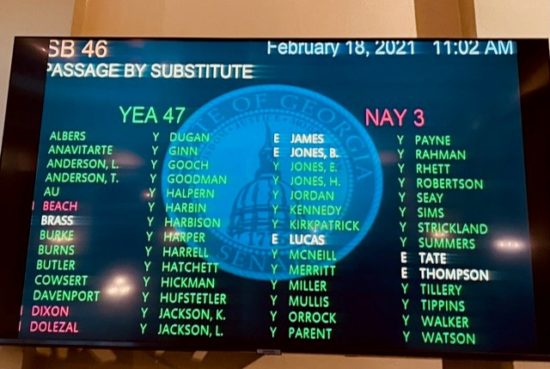
Legislative Days 17 – 19
GPhA’s priority piece of legislation, SB 46 (pharmacist vaccine expansion) continues to make its way through the legislative process at a good pace having passed out of the Senate with resounding support. This bill now crosses over from the Senate (its originating chamber) to the House for its consideration.
Legislation Introduced in Week 5
HB 413
Introduced by Representative Camp, this bill looks to prohibit state and local governments from implementing laws, rules, or orders from requiring the receipt of vaccines to prevent SARS-CoV-2 or COVID-19 for any reason unless certain requirements are met including, amongst other things that the vaccine has been licensed for use by the FDA. Emergency use authorizations do not count as “licensed,” by the FDA for purposes of the bill.
HB 447
Introduced by Representative Knight, this bill seeks to increase transparency in the state health benefit plan (SHBP) by requiring that contracts entered into by the Board for health care coverage or services under the SHBP contain provisions relating to disclosure of cost related data relative to the plan. Cost related data includes pricing information, rebate accounting, reimbursement rates, net profits, and consulting fees. This bill would also require disclosure of the foregoing information to the General Assembly and provides that this information be made subject to disclosure under Georgia’s open records act.
HB 448
Also introduced by Representative Knight, this bill is almost identical to HB 447 except that it acts upon contracts entered into by the Board for health care coverage or services under the Medicaid and PeachCare for Kids Program. It contains provisions relating to disclosure of cost related data relative to the plan. Cost related data includes pricing information, rebate accounting, reimbursement rates, net profits, and consulting fees. This bill would also require disclosure of the foregoing information to the General Assembly and provides that this information be made subject to disclosure under Georgia’s open records act.
HB 474
Representative Cooper introduced this bill which would require prescribers who prescribe an opioid for a patient to concurrently prescribe an opioid antagonist if the amount of opioid being prescribed is greater or equal to 50 MMEs. GPhA is closely monitoring this legislation.
SB 181
Senator Jordan introduced this bill which looks to reduce out-of-pocket costs for consumers requiring insulin. More specifically, it looks to limit the total cost sharing amounts for patients to no more than $50 per 30 day supply of insulin.
Previously Introduced Legislation
HB 93
Representative Cooper’s bill seeking to eliminate duplicative state licensure and regulation of clinical laboratories passed out of the House and crosses over into the Senate.
HB 367
Representative Parrish’s annual drug update bill was heard in the Judiciary Non-Civil subcommittee and GPhA offered testimony in the support of the legislation. It was favorably reported out of the subcommittee and then favorably reported out of the whole committee.
SB 80
Senator Kirkpatrick’s Ensuring Transparency in Prior Authorization Act was heard by a Senate Insurance & Labor subcommittee for a hearing only (no vote). While there was no vote, testimony was offered from stake holders both in support of the legislation and opposed to the legislation. GPhA testified in support as did the Dental Association and the Medical Association of Georgia.
2021 Legislative Update: Week 5
Legislative Days 13 – 16
And just like that, four percent of Georgia’s 2021 legislative session is on the books. While there were not an overwhelming number of pharmacy bills introduced, week 5 still proved to be consequential.
SB 46 (pharmacist vaccine expansion) was the subject of some attention, as there appeared to be an organized effort to oppose the legislation, including representations to senators that, amongst other things, the bill would mandate that patients receive certain vaccines. Of course, the bill does not contemplate any such vaccination mandate, and that point was driven home at the Senate Health and Human Services Committee meeting, in which the bill was favorably reported by substitute.
At the hearing representatives from GPhA, the Georgia Nursing Association, the Medical Association of Georgia, the Georgia Retail Association, the Georgia Hospital Association, CVS, and the Georgia Department of Public Health spoke out in support of the bill and its benefits to public health. In addition, online support was provided by Rx in Reach Georgia Coalition. The day of the hearing, many GPhA members also reached out to members of the committee in advance of the hearing to voice their support for the bill.
If passed, this bill will expand vaccines pharmacists and nurses can administer, pursuant to a protocol to all ACIP recommended vaccines for adults, as well as vaccine for an illness that have resulted in a public health emergency. Thus, if passed pharmacists would be able to administer, amongst other things, vaccines for COVID-19, Hepatitis A and B, TDAP, MMR, and HPV.
Legislation Introduced in Week 5
Introduced by Representative Ron Stephens, this bill looks to expand pharmacist to technician ratio from three to four technicians, provided that if a pharmacist is supervising four technicians then two of the four would need to be certified.
Representative Butch Parrish introduced the annual drug update bill that changes certain provisions relating to drug schedules for controlled substances and the definition of dangerous drug.
Previously Introduced Legislation
Representative Cooper’s bill seeking to eliminate duplicative state licensure and regulation of clinical laboratories was heard in the House Health and Human Services Committee and favorably reported via substitute. The substitute contained several changes requested by GPhA including clarifications with regard to CLIA waivers, the ability to sell HIV tests cleared by the FDA for home use, and the inclusion within the definition of pharmacy care of pharmacists administering tests that have been cleared by the FDA for home use. This authority currently resides in Georgia’s clinical laboratory code section which the bill seeks to eliminate so we are seeking to move the authority to the Pharmacy Practice Act.
GPhA is grateful to Representative Cooper and the Georgia Department of Community Health for working with GPhA to make these important changes to the bill.
Representative Kelley’s bill extending COVID-19 immunity protections for businesses and healthcare providers to July 2022 continues to move at a rapid pace, being favorably reported out of committee and the passing out of the House. It will now be considered by the Senate.
A Word on Pharmacist COVID-19 Testing
As you are likely aware, since the early days of COVID-19 testing, pharmacists have centrally figured into the equation with both large national chain pharmacies and independent pharmacies, performing COVID-19 tests for their patients both in Georgia and nationwide. Pharmacists in Georgia have been performing these functions pursuant to authority granted to them by US HHS pursuant to the PREP Act during the period of federally declared emergency.
The federally declared emergency is eventually going to expire, but the need to continue to test for COVID-19 is expected to remain. Thus, if pharmacists are going to be able to continue to administer COVID-19 testing, Georgia law is going to need to be changed. Over the last several weeks, GPhA has engaged with stake holders in an effort to continue to find a path forward for such change to the law.
The Medical Association of Georgia (MAG) remains opposed to a change in Georgia law allowing pharmacists to conduct COVID-19 testing. And while GPhA respects MAG’s position, it does not mean we agree with it. For the good of Georgia patients, GPhA anticipates legislation being introduced in the coming weeks to make just such a change in the law. In so doing, patients will gain greater access and flexibility to COVID-19 testing after the expiration of the EUA. It is important to note that while GPhA and MAG enjoy an excellent relationship, and very much want that to continue to be the case in the future, sometimes there are different perspectives on an issue, and we have reached one of those occasions on the issue of COVID-19 testing.
However, while not in agreement on this particular issue, GPhA and MAG’s relationship has born significant fruit over the last several years including collaborations on opposition to mergers, working together on PBM reform, advocating for greater transparency, and the promulgation of PBM regulations. We anticipate such collaborations to continue despite being at odds on the issue of COVID-19 testing. There will be more to come on COVID-19 testing in the weeks to come but we are going to rely on you, our members, to help let legislators know how important pharmacists are in assuring the public has continued access to COVID-19 tests in the months and years to come including the testing of both symptomatic and asymptomatic patients.
◀ Newer Posts Older Posts ▶

